
International Publishers in New York has recently issued The Untold History of Capitalism: Primitive Accumulation and the Anti-Slavery Revolution by the young scholar Enrique S. Rivera. As a fellow student of Latin American history (a long time ago!) I read his book with awe at his scholarship and at the daring conclusions he draws. I had the opportunity to sit down with the author, Enrique S. Rivera, Ph.D., for a chat.
Gordon: Thanks for joining me for this little, shall I say “intergenerational” chat. Congratulations on your new book, I should say your first book! It’s adapted from your UCLA doctoral dissertation. I’m amazed at how the history of history is changing. Did you specialize in Latin American colonial history? How did you come across this story, and what made you decide this is what you wanted to write about for your dissertation?
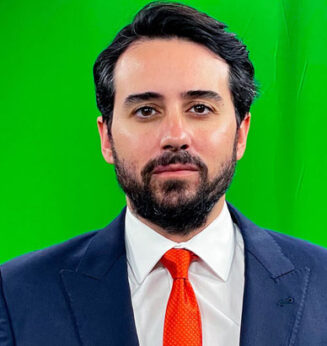
Rivera: The topic of the 1795 Coro Rebellion, in what is now Venezuela, came about during my first semester as an MA student in Latin American History at the University of Maryland, College Park. I took a course on 19th-century Latin America, and we had to write a historiographical essay for our final project. We had read a couple of books on slave rebellions during the period and it really piqued my interest. Before graduate school, I had read a bit on the Haitian Revolution, and that fascinated me. When I told the professor, Daryle Williams, that I wanted to write a historiographical essay on anti-slavery insurrections in Latin America, he suggested I look at works on a handful of famous historical moments that fit the bill, and one of them was the Coro Rebellion. But when I looked up works on it, I noticed that the most authoritative text was an essay written in 1910. I had previously spent some time in Venezuela as a journalist, and I love the country, so this would also be a good excuse to continue going. So I decided that this would be the topic of my MA.
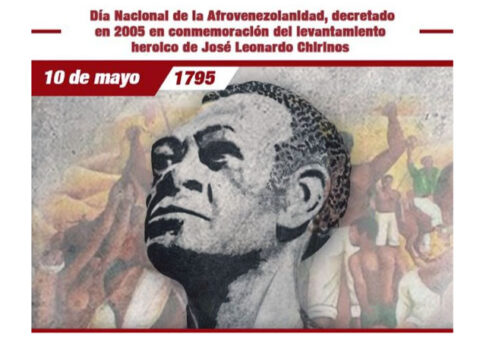
I continued working on the project when I began my Ph.D. program, first at Vanderbilt, then at UCLA. At Vanderbilt, I was fortunate enough to take a course on race and capitalism with Prof. Peter Hudson. He introduced me to Black and Global South Marxist scholarship, which—like Marxism, more generally—is actively avoided in Ph.D. programs in the United States. After my first year at Vanderbilt, Hudson transferred to UCLA, and he arranged for me to go with him. With him as my advisor, I decided to broaden the scope of my doctoral dissertation.
But, you know, as a good materialist, I should step back. I was initially attracted to this subject matter because I was born and raised at the intersection of white supremacy, imperialism, and capitalism. I exist because my father is a native of a U.S. colony (Puerto Rico) and my mother is a native of a U.S. neo-colony (El Salvador). My parents met in a Black city (Washington, D.C.), and I grew up in a Black neighborhood (Brookland). My parents met because they were involved in the liberation struggles of their respective countries and were drawn to the belly of the beast to do this work. I, therefore, witnessed the horrors of white supremacy, imperialism, and capitalism, but I was also exposed to the practice and theory of revolutionary resistance. These experiences—this knowledge—led me to study both resistance to slavery and to study capitalism itself, or the folks who are pulling the strings.
Gordon: Where did you find most of your original documentation? Were you holding these 18th-century reports and documents in your hands? Could you read the old Spanish handwriting easily enough? What did that feel like?
Rivera: I used documents from nine archives, so it’s hard to say where most came from. Because I began the research as an MA student, this book’s archival research was conducted over the course of eight years. Most were probably found in the Archivo General de Indias in Seville, Spain, which is famous among historians for its vast collection of colonial documents. I also found a lot of important documents in the Archivo General de la Nación and the Academia Nacional de Historia, both in Caracas. Also important were the Archivo Histórico del Estado de Falcón in Coro, the Nationaal Archief in The Hague, and The National Archives in Kew, England.
I did hold these original documents in my hands. Mostly in Spanish, but also in Dutch and English, and to a lesser extent in French and Latin. It’s a rather surreal experience and my favorite part of being a historian. It took me a while to get good at reading 18th-century handwriting, but I progressed nicely, and probably got better day by day.
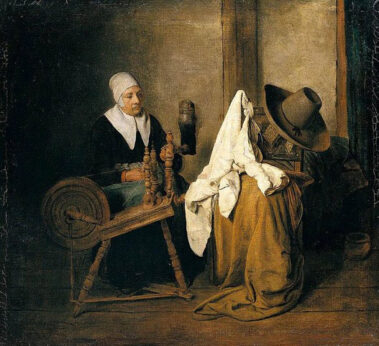
Gordon: I’ve read your book, and it’s quite an achievement. It’s like a view of the entire cross-Atlantic world from the eye of a migratory bird. We go from linen weaving in Flanders and rural England, into the boardrooms of royal colonial business enterprises, to the West Coast of Africa and the sort of native, quasi-socialist organization of its communities there, and a similar kind of social organization among the Indigenous peoples in the so-called New World. Very ambitious for a Ph.D. dissertation! Usually, they’re on a far more limited topic, not so “globalistic.”
Rivera: Thank you for your kind words. I don’t often get to read happy reviews. The culture in academia is a rather oppressive one. I’m not alone in the fact that my work has received little praise. So when it does, it’s a great feeling.
Like all ideas, the one to expand the scope of my dissertation from a local story to a global one was drawn from the wider conditions we all find ourselves in. With the 2008-2009 neoliberal economic crisis and the subsequent bailouts of big banks, people started questioning capitalism more than they had in the previous couple of decades. This sentiment crept into the ivory tower of academia, and a group of historians began developing a new subfield called “the history of capitalism.” It’s basically a successful rebranding of political economy, made for the 21st century, in that it asks questions that are tailor-made for today. A lot of these questions regarding race, slavery, and capitalism, in particular, have been taken up for the better part of the past century, but the interest never quite slipped into white petit-bourgeois intellectual circles as it has in recent years.
As I mentioned before, my work with Hudson made me start thinking of global political economy, and I thought this would be an important perspective to bring into my dissertation. My research took me to the various places you see in the book: I began tracking down where Coro’s textiles came from, where the capital came from, and where the enslaved and legally free Black people came from. It was an exciting and eye-opening process.
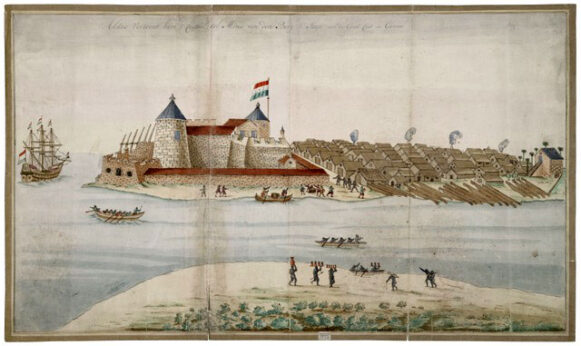
Gordon: Did you set out to sort of upset some Marxist applecarts, or at least bring more nuance and subtlety to this conversation? Or did it just gradually dawn on you that the story you’re telling is simply far more complex than you at first believed?
Rivera: No, I did not at all set out to interrogate Marxist paradigms. I walked in fully expecting to tell the history of how capitalism created slavery, the slave trade, Coro, etc. When I began my research, I was actually quite disappointed with what I found. In fact, I was devastated. Because the more I dug, the clearer it became that capitalism was nowhere to be found in the regions and time periods I investigated. This pushed me to look back at some of the empirical and theoretical literature on the genesis of capitalism, and what I found in the secondary literature directly and indirectly supported what I had uncovered in my own research. It was wild.
Gordon: Marx was famously quoted once as saying, “I am not a Marxist,” as he watched others take his ideas and apply them—clumsily and schematically in many cases. Do you think Marx himself, were he writing today, could basically have written the kind of book you’ve just published? He was a sophisticated guy, after all, who might not have found your ideas out of sync with his own critical process.
Rivera: Yes, I’d like to think he could have written this book himself were he alive today. At least, I don’t believe he’d disagree with any of the arguments I put forward. And he would also see that more historical research is needed into when, where, and how the capitalist mode of production developed. He would recognize, were he alive today, how race, sex, and class all kind of meld together in a lot of historical and geographical places. Engels certainly was on to this, at least in regard to gender and class, and Marx a bit as well with his writings “On the Jewish Question” and his chapters on primitive accumulation.
Gordon: From the way you write, it would appear that you’re also implicitly making a statement about the modern world. We have these international markets in cotton, cacao, coffee, palm oil, mining, garment manufacture, assembly plants, all kinds of products, yet on the ground, you don’t have to probe too closely to find elements of feudalism still in place. Was that your intention, or am I on the wrong track here?
Rivera: No, you’re right. But it’s important to note that I stumbled into this realization, and then I wrote about it as I was figuring it out. If you look at much of the underdeveloped world—take El Salvador, for example—you’ll find that much, if not most, of the population isn’t engaged in capitalist production, but peasant production. This isn’t to say that the national economies aren’t capitalist—they are. The engine that really keeps things moving in these countries is capitalist production. But you find that coexisting with other modes. And in the case of El Salvador, for example, most of the labor force works on their own accord—artisanal and peasant production.
And this is a controversial point here, but I think we need to respect the decisions that some revolutionary parties are making to develop their economies using capitalism as a gateway to a more equitable, socialist society. This isn’t the only route to take, but it is a route and an option. If you look at China, for example, it seems to have worked well as a means to improve living standards for their citizens and to slow the U.S. Empire. And as far as that’s concerned, it’s looking like a more just international order is being established because of China’s strategy. This is really important. Just as important, however, is the fact that China’s capitalist development, planned by a communist party, has really damaged the planet’s ecosystem. Though they certainly aren’t alone—in fact, they’ve done better than the other major powers. But a new set of rules needs to be established, I believe—one where economic activity must adhere to strict eco-friendly guidelines. If we can do this, then the underdeveloped countries can safely develop, whether they use capitalism or some other mode of social organization.
Gordon: Wow, my head is spinning. Okay, let’s talk about the Hollywood film. Director? Screenplay? Actors?
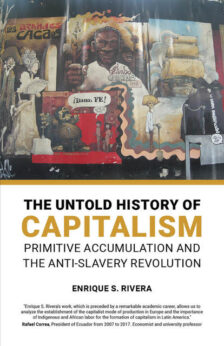 Rivera: That would be a wonderful dream come true! I think the Venezuelan film industry would need to spearhead anything like this. But if we’re going Hollywood, Boots Riley would be the director, I’d write the screenplay alongside him, and it would star LaKeith Stanfield, Daniel Kaluuya, Tessa Thompson, and Daniel Day-Lewis, who would come out of retirement.
Rivera: That would be a wonderful dream come true! I think the Venezuelan film industry would need to spearhead anything like this. But if we’re going Hollywood, Boots Riley would be the director, I’d write the screenplay alongside him, and it would star LaKeith Stanfield, Daniel Kaluuya, Tessa Thompson, and Daniel Day-Lewis, who would come out of retirement.
Gordon: I didn’t know he was in retirement. I can hardly wait to see it! Thanks so much, and good luck with your book!
Rivera: Thank you!
The Untold History of Capitalism: Primitive Accumulation and the Anti-Slavery Revolution
By Enrique S. Rivera
New York: International Publishers, 2021
ISBN: 9780717808663
Order your copy here.




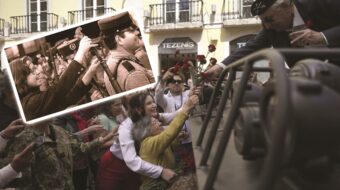







Comments